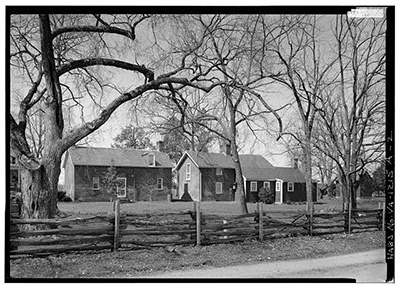Today is Giving Tuesday, the day when we turn our focus away from purchasing and toward giving to work that we care about. We hope you will consider a donation to help continue the work of Coming to the Table and Bittersweet so that we can continue to tell these stories and do the work of healing. Make your donation here – http://comingtothetable.org/grow-table/ And thank you.

The Slave Quarters at Bracketts Farm. (Image courtesy Historic American Buildings and Bracketts.org)
It’s a quiet place, on a quiet road, in a quiet county. A few dozen miles west of Richmond, Virginia. Louisa County, Virginia. Gordonsville. Bracketts Farm.
It’s a place I’ve spent only a few hours in my life, maybe 15 total. And yet, it’s a place I feel very connected to. Or I should say, I feel connected to the people who lived and worked there. More specifically still, the people who were enslaved there.
Here on Bittersweet, we talk a great deal about “linked descendants,” about the people who are linked because they were enslaved by or enslaved each other. In many ways, that linkage is the most fundamental, the most foundational to American history because those people share not only lineage and often blood but also place in all its permutations.
But there are other linkages, too. . . like mine with the people of Bracketts, who I am researching in boxes and boxes of archives. Or mine with the descendants of the people who were at Bracketts, my friends Gloria and Doris, who I only know because of this history, a tragic link for sure.
Gloria and Doris have recently found their ancestors – Charlotte and her sons Randol and Sam. Two more generations than they knew just a few months ago, even after years of Gloria’s genealogical work. Their ancestors were enslaved at this place. They are, therefore, linked to it through blood and sweat and struggle and beauty.
Genealogy. Blood. Place. Story.
Is there any way we are not linked to one another, any way that the stories of American history are not interwoven in scars and story? I don’t see any way we can deny how the stories of our lives as Americans loop into one another in tangles and knots, pictures and tapestries.
It seems time for us to swing our arms wide to each other and to our connections. Our links are a chain, battered, broken, but very intact nonetheless. At moments, our chain wraps around our necks and threatens to choke us. At others, it binds us to beliefs and holds us captive, trapped in an abandoned warehouse of tradition. But at others, it anchors us to each other, holds us steadfast in tumultuous times.
At Bracketts Farm, I choose to hold on to that chain tight because it ties me to who I am as a Southern woman, because the history and legacy of slavery have shaped every facet of our nation. But more, I hold onto the links of that chain because they tie me back to strong, perseverant, imperfect, beautiful people – enslaved and enslaver – and because they tie me, now, to friends and colleagues who work with me to untangle the chains and free us all.
If you are interested in supporting the work of Coming to the Table as we work to untangle the chains of history and heal the wounds rooted in slavery, please consider participating in our annual fund drive today, on #givingtuesday.
You can make a donation via this page – http://comingtothetable.org/grow-table/ All gifts are much-appreciated and tax-deductible. Thank you.


You said it so beautifully. Thank you.
“It seems time for us to swing our arms wide to each other and to our connections. Our links are a chain, battered, broken, but very intact nonetheless. At moments, our chain wraps around our necks and threatens to choke us. At others, it binds us to beliefs and holds us captive, trapped in an abandoned warehouse of tradition. But at others, it anchors us to each other, holds us steadfast in tumultuous times.”
Thank you so much, Yvette.